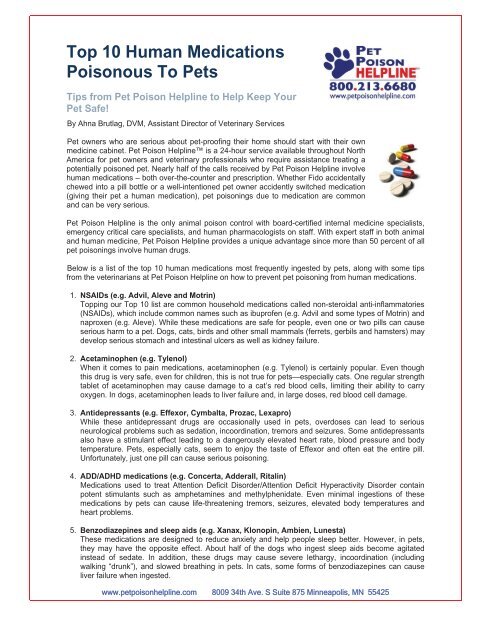Monark Puppies - Kennel Spotlight
Monark Puppies - Kennel Spotlight
Monark Puppies - Kennel Spotlight
You also want an ePaper? Increase the reach of your titles
YUMPU automatically turns print PDFs into web optimized ePapers that Google loves.
Top 10 Human Medications<br />
Poisonous To Pets<br />
Tips from Pet Poison Helpline to Help Keep Your<br />
Pet Safe!<br />
By Ahna Brutlag, DVM, Assistant Director of Veterinary Services<br />
Pet owners who are serious about pet-proofing their home should start with their own<br />
medicine cabinet. Pet Poison Helpline is a 24-hour service available throughout North<br />
America for pet owners and veterinary professionals who require assistance treating a<br />
potentially poisoned pet. Nearly half of the calls received by Pet Poison Helpline involve<br />
human medications – both over-the-counter and prescription. Whether Fido accidentally<br />
chewed into a pill bottle or a well-intentioned pet owner accidently switched medication<br />
(giving their pet a human medication), pet poisonings due to medication are common<br />
and can be very serious.<br />
Pet Poison Helpline is the only animal poison control with board-certified internal medicine specialists,<br />
emergency critical care specialists, and human pharmacologists on staff. With expert staff in both animal<br />
and human medicine, Pet Poison Helpline provides a unique advantage since more than 50 percent of all<br />
pet poisonings involve human drugs.<br />
Below is a list of the top 10 human medications most frequently ingested by pets, along with some tips<br />
from the veterinarians at Pet Poison Helpline on how to prevent pet poisoning from human medications.<br />
<br />
1. NSAIDs (e.g. Advil, Aleve and Motrin)<br />
Topping our Top 10 list are common household medications called non-steroidal anti-inflammatories<br />
(NSAIDs), which include common names such as ibuprofen (e.g. Advil and some types of Motrin) and<br />
naproxen (e.g. Aleve). While these medications are safe for people, even one or two pills can cause<br />
serious harm to a pet. Dogs, cats, birds and other small mammals (ferrets, gerbils and hamsters) may<br />
develop serious stomach and intestinal ulcers as well as kidney failure.<br />
2. Acetaminophen (e.g. Tylenol)<br />
When it comes to pain medications, acetaminophen (e.g. Tylenol) is certainly popular. Even though<br />
this drug is very safe, even for children, this is not true for pets—especially cats. One regular strength<br />
tablet of acetaminophen may cause damage to a cat’s red blood cells, limiting their ability to carry<br />
oxygen. In dogs, acetaminophen leads to liver failure and, in large doses, red blood cell damage.<br />
3. Antidepressants (e.g. Effexor, Cymbalta, Prozac, Lexapro)<br />
While these antidepressant drugs are occasionally used in pets, overdoses can lead to serious<br />
neurological problems such as sedation, incoordination, tremors and seizures. Some antidepressants<br />
also have a stimulant effect leading to a dangerously elevated heart rate, blood pressure and body<br />
temperature. Pets, especially cats, seem to enjoy the taste of Effexor and often eat the entire pill.<br />
Unfortunately, just one pill can cause serious poisoning.<br />
4. ADD/ADHD medications (e.g. Concerta, Adderall, Ritalin)<br />
Medications used to treat Attention Deficit Disorder/Attention Deficit Hyperactivity Disorder contain<br />
potent stimulants such as amphetamines and methylphenidate. Even minimal ingestions of these<br />
medications by pets can cause life-threatening tremors, seizures, elevated body temperatures and<br />
heart problems.<br />
5. Benzodiazepines and sleep aids (e.g. Xanax, Klonopin, Ambien, Lunesta)<br />
These medications are designed to reduce anxiety and help people sleep better. However, in pets,<br />
they may have the opposite effect. About half of the dogs who ingest sleep aids become agitated<br />
instead of sedate. In addition, these drugs may cause severe lethargy, incoordination (including<br />
walking “drunk”), and slowed breathing in pets. In cats, some forms of benzodiazepines can cause<br />
liver failure when ingested.<br />
www.petpoisonhelpline.com 8009 34th Ave. S Suite 875 Minneapolis, MN 55425









